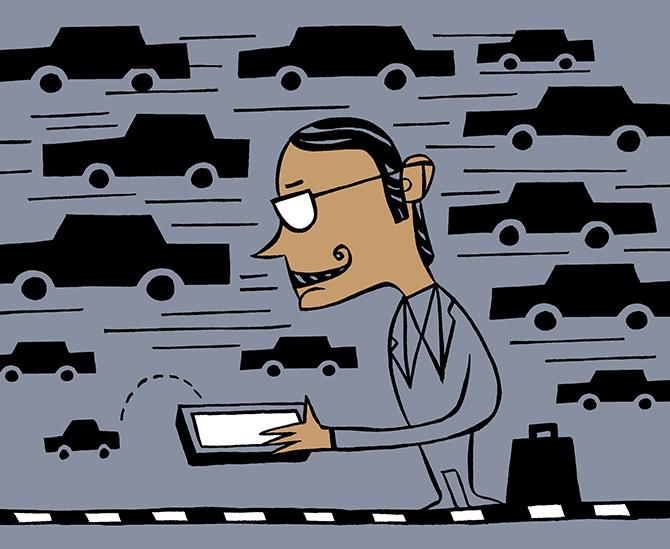While the talks gathered pace after the announcement of the Uber-Grab merger, the question on who will control the merged entity is delaying the process.
Illustration: Uttam Ghosh/Rediff.com

The country’s competition watchdog, the Competition Commission of India, could put a roadblock in the merger of Uber and Ola in India, after the Competition Commission of Singapore (CCS) flagged up a similar case in the Southeast Asian ride-haling sector.
Last week, the CCS initiated an investigation into the merger of Uber and Grab, saying this could create a monopoly in the region.
It also asked both players to maintain their pre-transaction independent pricing.
Japanese investment giant SoftBank, a common investor in both Ola and Uber, is learnt to be mediating the merger talks between the two companies in India, where both firms control around 95 per cent of the cab-hailing market.
While the talks gathered pace after the announcement of the Uber-Grab merger, the question on who will control the merged entity is delaying the process.
According to experts, the proposed merger in India will lead to a monopoly in the cab aggregation segment.
If one considers the overall cab space, according to industry estimates, Ola controls 55 per cent of the market, while Uber holds 40 per cent.
“A merger will require CCI approval and a lot depends on the technical analysis of Uber and Ola,” said Vinod K Dhall, former acting chairman of the CCI, who is currently the executive chairman for competition law practice at Vinod Dhall – TT&A.
“Ola-Uber merger will make them the only player in the segment and it is definitely going to be an important matter for analysis for the CCI,” he said.
According to the Uber-Grab merger deal, the Singapore-based ride-hailing firm will acquire Uber’s operations in the Southeast Asian region, including food delivery service, UberEats.
Uber will hold a minority stake of 27.5 per cent in Grab, and its chief executive officer will join the board of the Singapore-based company.
The objection by the CCS might create many problems for Uber and Grab as well as their investor SoftBank, which was hoping for a quick exit by Uber from the Southeast Asian market.
Competition gets ready for a payout
Not only the CCI, many of the players who lost a chunk of their market share because of the price war between Ola and Uber will contest for damages.
“The moment there is consolidation, many of the companies that have lost will claim under the Monopolistic and Restrictive Trade Practices Act that they have been pushed out of business because two large players are in a price war and now there is consolidation,” said Siddharth Pahwa, former CEO of Meru Cabs.
“This is a regulated sector in India as fares are regulated by the government. So, if there is too much of consolidation and consumer is taken for a ride, the government will get involved,” he said.
Meru, along with Radio Taxi Association, had registered complaints with the CCI. Pahwa said CCI could take up suo motu.
“They can start an investigation where they believe there is monopolisation.
"The laws state that if the interest of other players and the consumers are affected, action can be taken.
"Even if the CCI does not do on its own, there is a PIL route available for the consumer forums to raise the issue,” he added.
Independent bodies such as Indian Foundation of Transport Research and Training (IFTRT) said they would lodge a complaint with the CCI once they have tangible evidence.
“Once IFTRT has tangible evidence (of the merger), we shall definitely consider stopping this monopoly.
"It is a fit case for the CCI to look into restrictive trade practices and oligopolistic behaviour of Ola and Uber, which may now emerge as a strong monopoly if they merge,” said SP Singh, senior fellow and coordinator, IFTRT.













 © 2025
© 2025